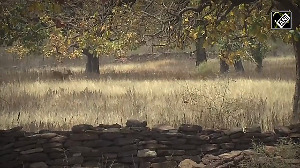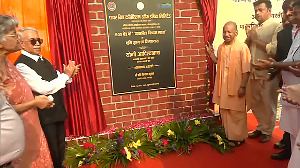For China, the Games, with a whopping $2 billion budget (but short of Athens's $2.4 billion), is not a mere sporting event but a chance to show the world that after three decades of reclusive socialism, it has leapt into the big league following three decades of economic "open door".
The technocratic fourth generation of leaders under President Hu Jintao and Prime Minister Wen Jiabao want to use the Olympics to showcase how prosperous and advanced the country really is.
As a result, China is under intense media scrutiny. The press has raked up its human rights record and put the dormant issues of Tibet and Taiwan under the scanner. It has also put a spotlight on contentious domestic issues such as unrest in the Uighur province of Xinjiang and widespread Tibetan protests in provinces such as Gansu and Qinghai.
More recently, the epic 130-day Olympic torch relay ran amuck in cities such as Paris, where it was hijacked by a blitzkrieg of Tibetan activists. The relay also enraged environmentalists protesting against the highway up to Mt Everest.
But China is leaving these dampeners behind as it edges towards the stunning opening ceremony directed by veteran film director Zhang Yimou (Raise the Lantern, Hero). The nation has roped in Cai Quoqiang, a New-York-based artiste known for his work with gunpowder, who will apply his talents towards the pyrotechnics at the opening and closing ceremonies.
Though the details are a closely guarded-secret, Zhang told the The New York Times, "The Olympic circle is round, the National Stadium is circular and there is Cai's circle in the sky", indicating that Cai is likely to create a mesmerising artistic display involving the circle.
But it is China's monumental venues featuring cutting-edge designs that will be the centre of all attention, beginning at the gateway to the Games - the Beijing Airport. The airport has been designed by British architect Norman Foster, who beat stiff competition from artist Damien Hirst (among others) to bag "Britain's Best 2008" in the arts category.
Terminal 3 is an architectural gem, its surface area larger than all of Heathrow's five terminals. The airport, estimated to handle 50 million passengers by 2020, has a distinctive silhouette that shows off its blazing yellow, orange and red lights (the Olympic colours).
In comparison, the recently unveiled Bangalore airport, designed by a Swiss consortium, has proved a disappointment. It waits to be seen if Delhi's slated Terminal 3 by an Indian consortium will put it on the world design map - hopes are high, since the same consortium put up a nicer airport in Hyderabad.
The showpiece of the Games is the 230-feet tall, $500 million "Bird's Nest" or National Stadium, which will play host to the opening and closing ceremonies. It is a unique structure of metal lattice built with 45 tonnes of unwrapped steel. It has been designed by Swiss architects Jacques Herzog and Pierre de Meuron, who also designed Tate Modern, London, and more recently, Barcelona Forum in Spain.
The Bird's Nest, marked as one of the most iconic buildings of this decade, boasts an innovative green design and features a rainwater collection system and a translucent roof to provide sunlight for the grass.
Other jewels in Beijing's crown include the National Aquatics Centre, also called the "Water Cube", built using more than 100,000 sq m of lightweight, transparent Teflon over a steel base to replicate the natural formation of air bubbles.
There is also the Wukesong Cultural and Sports Centre, the main sports venue; the Laoshan cycling cluster with a 250-meter circumference wooden cycling track designed to produce new world speed records; and the Laoshan BMX venue, reportedly the most difficult track in the world.
With the Commonwealth Games slated to be held in Delhi in 2010, Delhi may well take pointers from Beijing. Beijing city, with a 17 million population (Delhi, 15 million), has been spruced up for an estimated 10,500 athletes, 200,000 accredited personnel and 6 million spectators.
Beijing's infrastructural makeover includes a network of new subway lines that will carry between 200,000-300,000 people a day, ring roads (such as in Delhi), power plants and water treatment facilities.
It also boasts of a slew of new cultural facilities such as the China National Grand Theatre, west of Tiananmen Square, designed by renowned French architect Paul Andreu - a bubble-shaped, glass and titanium wonder.
Beijing has enrolled its taxi drivers for English lessons, and a nation that loves its "Double Happiness" cigarettes has started posting "No smoking" signs inside its 66,000 cabs to create a non-smoking Olympics.
One of the most incredible things about China is the safety that cabs and public transportation affords women - and while Delhi is pumping $6 million on sanitation and $230 million on its Games village, it needs to work on ensuring a safer Delhi. Beijing had eliminated the use of ozone-depleting substances in 2004, six years ahead of the Montréal Protocol's target date.
The city has employed 1,000 doctors and nurses with a volunteer team of 3,000 doctors to treat athletes, journalists and VIPs at 170 medical stations and 140 ambulances, and the Beijing Olympics call centre will operate 24x7.
State-of-the-art systems have been devised to guide people to tourist spots, and 5,000-plus high-tech public toilets with remote sensor flushing and piped music (which cost $57 million) have been completed.
Beijing has used 1,109 kg of silver to make 6,000 medals, and much of that silver, China hopes, will end up in Chinese hands. Unlike India, where athletes have to struggle for funds, China has a system of rigorous athletic schools.
Athletes join national teams from the age of 18, but in exceptional circumstances they can do so from 12 years onwards. Those who make the team receive generous state allowances along with medical, life and accident insurance policies.
Cheering on the sidelines are the mascots Fuwa (literally, good luck dollies) - a group of five: Bei Bei, the fish, which signifies prosperity; Jing Jing, the panda, which signifies happiness; Nini, the Tibetan antelope, to signify vastness; and Ying Ying, the swallow, representing the infinite sky and good luck; all surrounding Huan Huan, or the fire of the Olympic Flame.
Each of the Fuwa has a rhyming two-syllable name, and collectively the first syllable of each results in the phrase "Beijing huanying ni" or "Beijing welcomes you".
In order to ensure the Olympics go off without a hitch, China has embarked on an ambitious security programme following reported threats by the Uighurs. It has deployed Red Flag 7 missiles. The US, Britain and Interpol have issued travel warnings even as Interpol's help has been sought to gather names, fingerprints, photographs and DNA profiles of anyone who might pose a threat.
For the duration of the Olympics, China will have automated access to Interpol's passport and visa application screening processes, giving it the most advanced early detection system against fake travel documents and criminals.
Critics claim much of the terror threat has been fabricated to provide an excuse for a crackdown on dissenting groups. Any marches, demonstrations or other large gatherings exceeding 1,000 participants need prior authorisation.
What is less known is that so nervous is the government that it has tightened visa restrictions for both visitors and foreign residents living in China. Prior to the games, foreigners could get year-long work visas with little hassle through a number of agencies in Hong Kong, but since the spring of this year these same foreigners, many of whom had been living in China for as long as eight years, discovered they could no longer renew their visas.
No official explanation has been issued. And tourists wanting to visit China for the Games have had to undergo a huge rigmarole to obtain visas, with demands that they provide proof of tickets and notarised invitation letters if they choose to stay anywhere but in a hotel.
Some visa seekers at the Chinese embassy in London, having endured four-hour waits, have given up. The visa restrictions are hurting China. Beijing has 120 Olympic-contracted hotels with a capacity of 32,000 rooms, but even by late June, hotels in Beijing and Shanghai reported occupancy rates at 60 per cent, well below those during the normal summer season, and at last count there were over 1 million Olympic tickets left unsold.
Even though the cup of nationalism is overflowing with slogans such as "New Beijing, Great Olympics" or "Unite together towards the Olympics", not everyone believes in them. The massive scale and cost of operations have raised questions.
While the design, quality and speed of construction of much of the infrastructure are impressive, many of the totems of patriotism have been designed with the help of foreign architects. There was controversy in Beijing where the massive projects involved relocation of over 6,000 families, even as thousands of underpaid migrant workers slogged 24 hours a day across the city's numerous construction sites.
Some of those originally involved in the Olympics have lost faith in the dream. Hollywood director Steven Spielberg, the artistic adviser, resigned on grounds of China's Darfur policy. Actor Mia Farrow slammed the Olympics as "Genocidal Olympics". Celebrated Chinese artist Ai Wei Wei, associated with the Bird's Nest, criticised the government for using the Olympics to whip up a false sense of nationalism.
Ai told The Age, "It is a pretend harmony and happiness." In a sense Ai is right. In striving so hard to make everything perfect, China is acting a bit like an overzealous PR firm. Only in August will we find out if it manages to pull it off.








 © 2025
© 2025